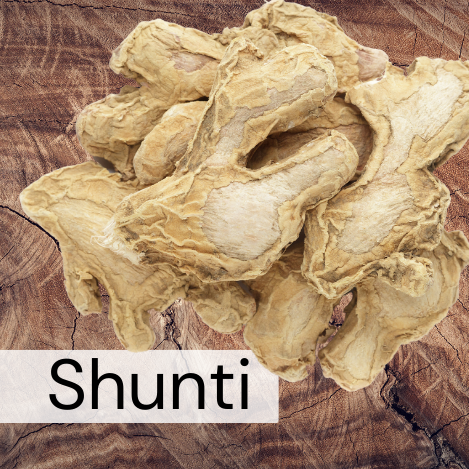For order and delivery updates
For order and delivery updates


Ginger, also known as "Shunti" in Ayurveda, is a revered herb that has long been praised for its healing properties. This humble root holds a special place in Ayurvedic medicine, where it is valued for its numerous health benefits, therapeutic properties, distinctive flavor, and versatility. From culinary delights to herbal remedies, it has played a pivotal role in Ayurvedic healing, making it a cornerstone of this ancient system of medicine.
It is indigenous to Southeast Asia and is known by the scientific name Zingiber officinale. This herb is described in Ayurvedic texts like the Charaka Samhita and Sushruta Samhita as a potent herb with a variety of medicinal uses. Shunti's therapeutic properties are classified as "Ushna," or heating in Ayurveda. It is known to balance the "Vata" and "Kapha" doshas while increasing the "Pitta" dosha. It is used in many Ayurvedic compositions because of its warming properties.
Ayurveda classifies this herb as having the following properties:
The therapeutic potential of this herb is vast, and it is renowned for its ability to address various health concerns. Some of the health benefits of this herb are:
It is available in various forms, each offering its own unique advantages.
This herb is a key ingredient in numerous Ayurvedic formulations. Some of the well-known formulations are Chyawanprash, Triphala, and Ginger-lemon-honey syrup. To avail of these products, visit Ayurcentral, a one-stop solution for all Ayurvedic products.
While this herb offers a plethora of benefits, it is essential to use it carefully, as excessive usage may cause some allergic reactions, such as itching, swelling, or difficulty breathing. If you experience any doshas, stop using it and consult our doctors.
The dry ginger, is a powerhouse in Ayurveda. Its healing properties range widely in terms of health advantages, from promoting healthy digestion and easing motion sickness to lowering inflammation and boosting the immune system. Ginger is a cherished and essential ally in the quest for holistic health and well-being, whether it is used in culinary creations or herbal medicines.

Tools and strategies modern teams need to help their companies grow.

1️⃣ Clove & Salt – Slowly chew a clove with salt and swallow the juice to gradually reduce phlegm and…

1️⃣ Warm Salt Water Gargle – Helps relieve discomfort and soothes a sore throat. 2️⃣ Haritaki & Honey Paste –…

1️⃣ Poppy Seed Payasa/Kheer – Drink porridge made from poppy seeds an hour before bedtime for peaceful, undisturbed sleep. 2️⃣…




Upload your prescription here, and our team will review it and contact you shortly to process your order.
Submitted successfully.
Our team will get in touch with you soon to process your order.
Select Language
